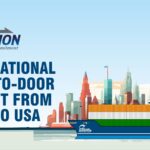Last updated on August 18th, 2025 at 10:49 am
Project Cargo Freight Forwarding Defined: Global Giants on the Move
If you have ever tried relocating oversize equipment like construction equipment or huge turbines, then you must have come across Project Cargo.
Project Cargo Freight Forwarding is like normal freight forwarding but on a different, more advanced level. This specifically pertains to colossal turbines, oversized construction equipment, or huge yet fragile industrial parts. In the fields of energy, construction, mining, or advanced manufacturing, knowing the intricacies of Project Cargo freight forwarding can avoid expensive delays by planning better and ensuring that the machinery arrives at the needed location carefully and right on schedule.
📦 What Is Project Cargo?
In very simple terms, Project Cargo is the transport of oversized freight that cannot be moved through standard freight systems. These oversized freight materials can be a streamlined part of a colossal construction and any delays can halt a project.
Common examples include:
- Parts of wind turbines
- Oil-related drilling machinery
- Large structural steel, like sections of bridges
- Generators and transformers of power plants
- Large scale machinery used in mining
In logistics, this falls within:
- Oversized freight forwarding – Transportation of freight exceeding standard weight or dimensions.
- Heavy lift transport – Cargo that requires cranes, trailers, or special lifting gear.
- Specialized cargo handling – Tailored methods that safeguard cargo from being damaged during packing, loading or securing.
🌍 Why This Is Important for Your Business
For companies managing complex projects, project cargo is not just another item on the supply chain list. Without this critical machinery, project work can come to a standstill, the budget can balloon, and the clock can get reset.
Three fundamental reasons why project cargo should matter to you:
Ensures projects stay on track – Stalled work from delayed critical component delivery can attract hefty fines.
Reduces risk exposure – Specialized handling lowers the risk of damage to equipment or machinery.
Bridging global supply chains – Whether halfway around the world, your supplier is connected via project cargo logistics.
🔄 The Steps of the Process (And What to Anticipate)
If this is your first encounter with project cargo logistics, I will simplify the processes that will transpire in the shipment to give you more insight in the whole shipment logistics.
Planning and Route Assessment
No cargo is moved without logistics specialists studying the shipment, creating a complete schedule of movement and pinpointing critical issues on the route such as low hanging bridges, narrow roads, and restricted ports.
Choosing the Transport Mode
Air freight, multimodal logistics and sea freight are options for your shipment, and will be selected based on how emergent the shipment is, how far it is, and their associated costs.
Securing Permits
For movement, particularly across borders, oversized cargo is usually treated as controlled goods and hence requires special government permits to be obtained.
Loading and Handling
Certain self-propelled modular transporters (SPMTs) and high-capacity cranes are specifically designed to maintain and relocate cargo, to ensure that the cargo is secure, and CASE requires special attention to high-capacity cranes.
Delivery and Offloading
Once the equipment is delivered, it is unloaded with care before being moved, to ensure the equipment is protected. In some cases, the equipment is then moved to the project site.
⚠️ Challenges to Anticipate
If you plan on projecting shipment of cargo, then I advise that it should be for domestic work as that shipment will be unpredictable. The shipment across international borders causes unpredictable customs associated with shipment. Here is a list of the most critical moving shipment cross borders.
Regulatory Complexity – Different countries’ customs and road transport for the better are unique.
Limitations Due to Infrastructure – Not all routes are suitable for heavy lift transport and not all roads or ports are equipped to handle heavy lift transport.
Weather Risk – Sea and stormy weather.
Oversized freight forwarding is more expensive. It is costly to allocate resources, and poor planning increases costs.
No one wants expensive surprises, so working with your freight forwarder to devise strategies to mitigate these costs and plan for contingencies after these risks have all been identified is crucial.
🏭 Who Typically Uses Project Cargo Freight Forwarding?
Businesses in these categories require project cargo services and are most likely to use them.
- Energy and renewables, including wind, require transport and fixing of offshore oil equipment, turbines, and transformers.
- Construction and infrastructure use project freight to move bridge beams, railway parts, and cranes.
- Mining and heavy industry require transport of excavators, crushers, and conveyors.
- Manufacturing plants use project cargo to move entire assembly or robotic arms.
Partnering with these forwarders allows delivery and logistics tailored to the most complex and costly scheduling requirements.
🌬️ A Real-World Example
Let’s take the example of the company building a wind farm. The site will require the use of a wind farm and blade measuring over 70 meters, requiring a 40 foot container. The entire shipment will take several months and will require:
- Road transport to the port using extendable trailers.
- Sailing via sea freight for the longest part of the journey.
- Destination specialized offloading
- Final site transport includes escort pilot vehicles to the site.
Cascading delays are possible due to interdependencies. Installation site downtime can become extremely expensive.
🎯 Choosing a project cargo partner
As a freight forwarder partner specialized in project cargo shipment, we offer the following services:
Proven Experience – Share shipment history documenting freight handled and shipped.
Global Network – All essential transit locations are covered.
Technical Capability – Equipment, transports, and other specialized tools and gear are readily available.
Clear Communication – Updates, delays, and other pertinent information are relayed transparently without concealing any details.
End-to-End Service – All inclusive. Planning, execution, securing necessary permits, transport, and final delivery. All coordinated within one group.
✈️🚢🚆 Selecting the mode of transport
Your cargo can be transported by:
- Air Freight – High urgency items of great value in need.
- Sea Freight – Extremely large or heavy items of significant weight.
- Multimodal Logistics – A variety of modes can be used to optimize logistics efficiency.
The balance between speed, cost, and safety is critical in route selection and can be best determined by a competent provider.
📈 Trends to Watch in Project Cargo
Should your organization require project cargo services in the next few years, your business requires careful consideration on the following trends:
Sustainability—Energy-efficient vessels as well as optimized route selection are now the standard.
Digital Tracking—Real time shipment monitoring has become the industrial standard.
Renewable Energy Growth—The demand for heavy lift transport is skyrocketing due to ongoing solar and wind projects.
🤝 Why Spedition
When it comes to Project Cargo Freight Forwarding, there’s no room for trial and error. Your shipment is too valuable, too large, and too time-sensitive to risk delays or mishandling.
Spedition delivers end-to-end project cargo logistics — from route planning and permits to heavy lift transport and multimodal coordination — ensuring your cargo reaches its destination safely, on time, and within budget.
We’ve moved wind turbines, refinery equipment, infrastructure components, and heavy industrial machinery for some of the world’s biggest projects. We know the stakes. We know the challenges. And we know how to deliver.
📞 If your next project demands absolute precision, we’re ready to make it happen.
Get in touch with our Project Cargo experts today



